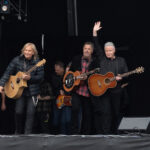Have The Cure, the iconic band fronted by Robert Smith, ever truly embraced youth? Even in their early days amidst the UK punk scene, this group from Crawley possessed a certain sophisticated melancholy, choosing introspection over youthful exuberance. This inherent maturity perhaps explains why they wear their veteran status so gracefully. Songs of a Lost World, their latest album after a sixteen-year hiatus, isn’t about chasing trends or recapturing past glories. It’s a deliberate, unhurried exploration of their signature sound, tailored for an audience that has grown alongside them, or for new listeners drawn to their timeless gothic artistry.
After decades in the music industry, The Cure could easily rest on their laurels. Instead, Songs of a Lost World emerges as a testament to their enduring creativity, albeit one that favors contemplation over catchy pop anthems. Unlike albums that delivered upbeat hits like “The Lovecats” or the infectious energy of “Just Like Heaven,” this new offering deliberately resides in a lower tempo. There are no psychedelic bursts reminiscent of “The Caterpillar” here, nor is there an overt attempt to court a younger generation unfamiliar with their extensive back catalog. With the possible exception of “Drone:Nodrone,” which injects a dose of steely, gothic funk, the album maintains a consistently measured pace, evoking a mood of elegant weariness rather than youthful fervor. This is The Cure sounding definitively grown-up, comfortable in their skin, and deeply immersed in their sonic world.
But to interpret the album’s slow burn as stagnation would be a misreading. Songs of a Lost World is not static; it’s a journey inward, a refined exploration of the sonic landscapes The Cure have always inhabited. The opening track, “Alone,” exemplifies this graceful aging within rock music. Reeves Gabrels’ guitar work is gloriously textured, intertwining with Jason Cooper’s powerful drumming, while ethereal keyboards provide a melancholic backdrop. The production is expansive, conjuring images of dramatic landscapes, yet it prioritizes thoughtful reflection over youthful impulsiveness. When Robert Smith’s voice enters, three minutes into the track, declaring, “This is the end/Of every song that we sing,” it carries a weight of finality, a strangely comforting acceptance of endings.
While Songs of a Lost World might not represent a radical departure for The Cure, its strength lies in its nuanced refinement of their established sound. Beyond the Nico-esque drone introduction of “Warsong,” the album largely operates within the sonic palette fans have come to expect and cherish. Simon Gallup’s basslines remain characteristically robust and grounding, providing the same driving force he’s consistently delivered since 1979. Jason Cooper’s drumming echoes the tom-heavy intensity of Lol Tolhurst’s work on Pornography, particularly in its rhythmic depth and impact. The spectral synth melodies in tracks like “Alone” and “Endsong” resonate with the haunting beauty of “All Cats Are Grey” from Faith, showcasing the band’s consistent ability to evoke profound melancholy. Even Reeves Gabrels, the relative newcomer to the band, adds his distinct flavor without disrupting the core Cure sound. His feedback and fuzz on “Warsong,” and the distorted wah-wah on “Drone:Nodrone,” serve as subtle reminders of The Cure’s foundational influence on the shoegaze genre and their continued relevance in shaping alternative music.
Songs of a Lost World is not an album striving for radio play or viral moments. It’s an album for considered listening, for immersing oneself in the richly textured soundscapes and introspective lyrics that are hallmarks of The Cure’s artistry. It is a mature, perhaps even autumnal, statement from a band that has long since defined its own terms of engagement with the music world. For long-time fans and newcomers seeking substance over fleeting trends, Songs of a Lost World offers a deeply rewarding and characteristically Cure-esque experience.

